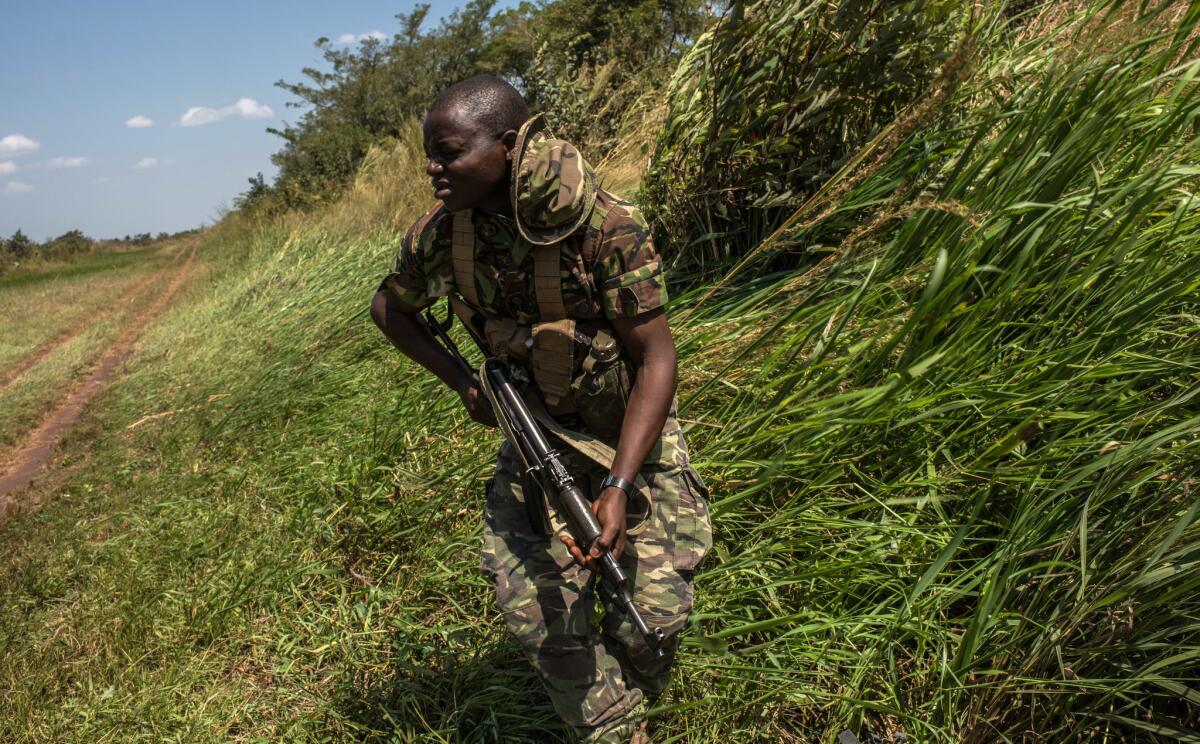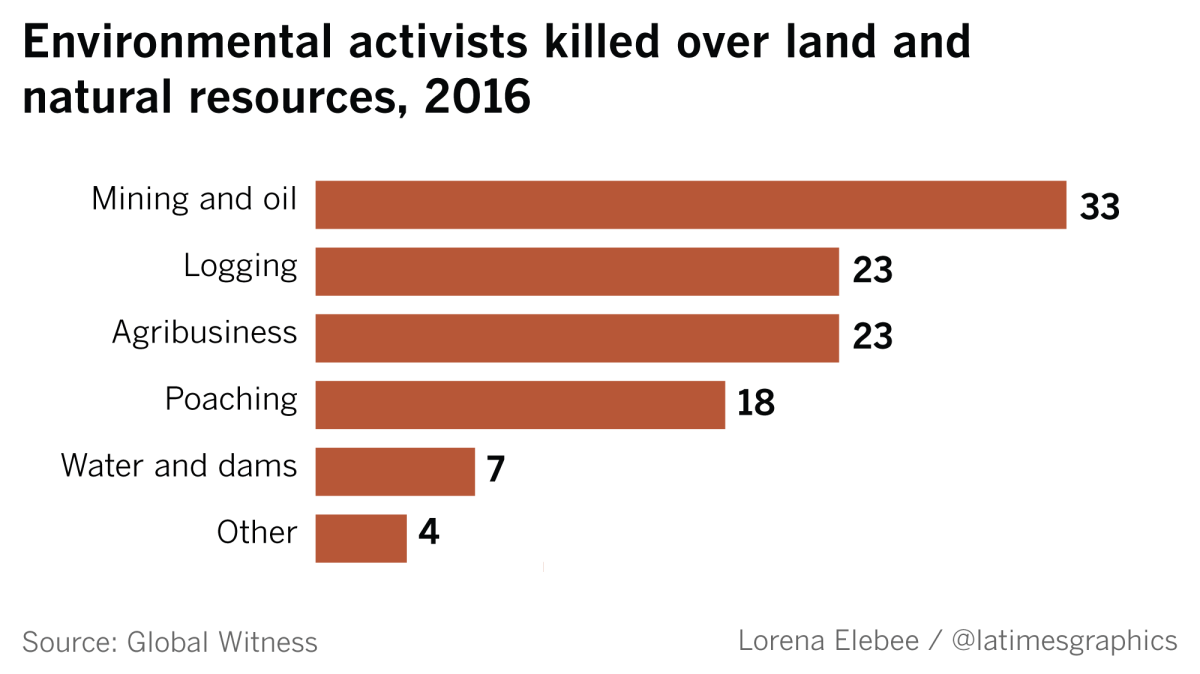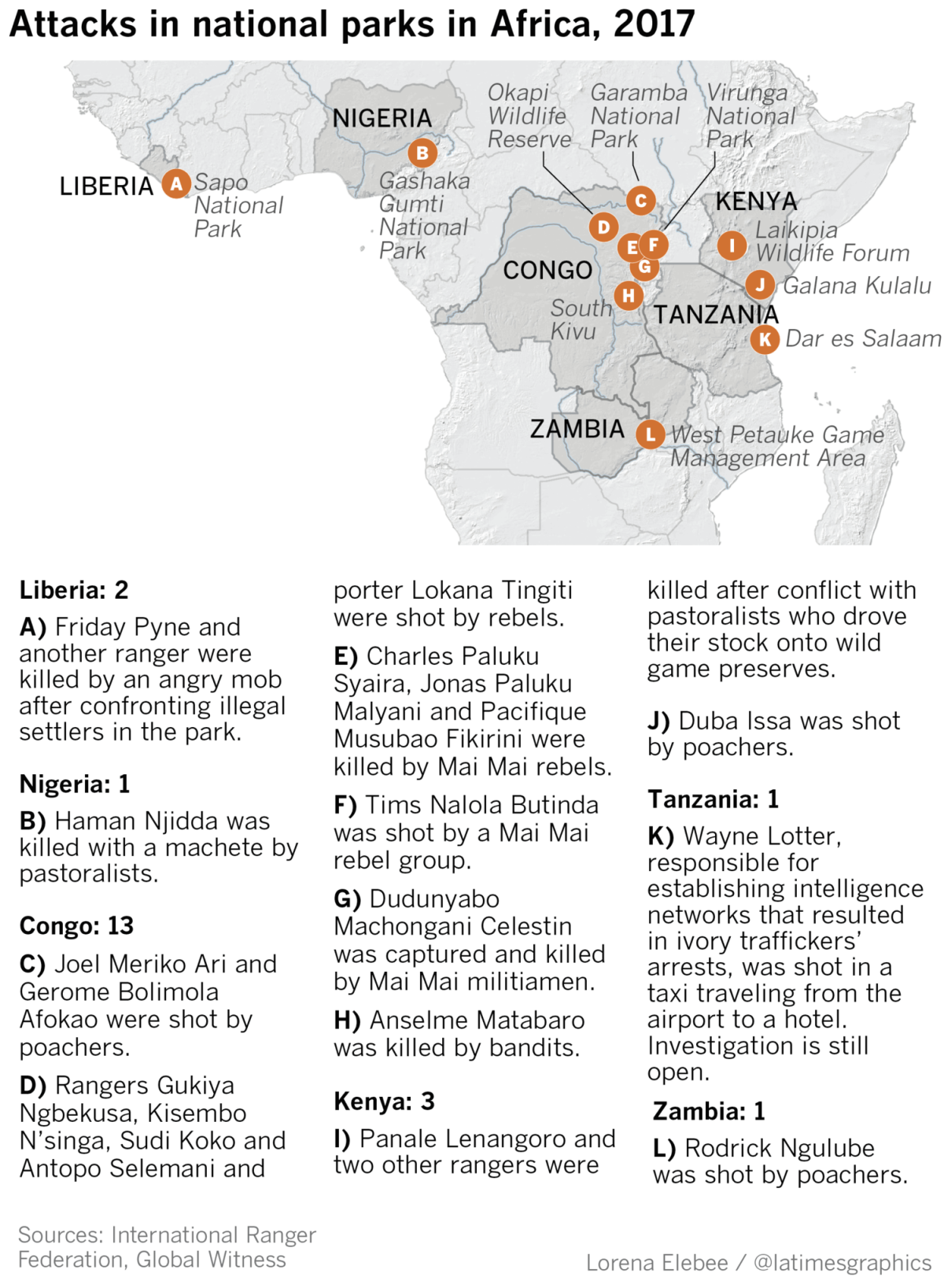‘Am I going to get out of here alive?’ In one of Africa’s most dangerous corners, a fight to the death for the elephants



Kambale Mate huddled beneath a tangle of grass, looking up at bright stars in a moonless sky, a tumble of chaotic events cascading through his mind.
Where were the other wildlife rangers, Jean de Dieu Matongo and Joel Meriko Ari? Were they alive?
He had been a ranger for only five months at Garamba National Park, the last remaining preserve for disappearing populations of elephants and giraffes in this part of Africa. Yet here he was with two comrades, hiding like small, petrified mammals in the grass. If any of them moved, a large band of poachers nearby could find and kill them.
A hassock of grass cradled his back as he looked up. He couldn’t remember quite how he had escaped the shrieking storm of bullets. What he remembered was the crunch of the crisp, dry leaves as boot steps crept through the dusk.
The world is experiencing an epidemic of environmental killings. Last year 200 environmental defenders — citizens protesting mining, agribusiness, oil and gas development and logging, as well as land rights activists and wildlife rangers — were killed, according to the London-based nonprofit Global Witness. In the first 11 months of this year, the number was 170.
The reasons are many: corruption; rising global demand for natural resources; companies’ growing willingness to exploit new areas; and a dearth of accountability, as governments and corporations increasingly work together on resource development agendas.
“We’ve seen impunity breeding more violence,” said Billy Kyte, a Global Witness official. “Those carrying out those attacks know they can get away with it. We’re seeing more brazen attacks than before.”

Total attacks have doubled from what they were five years ago, and they have been spreading. In 2015, Global Witness recorded killings in 16 countries. Last year, it was 24.
Latin America, in the midst of a boom in resource extraction as billions of dollars in new investments stream in from China and elsewhere, was the deadliest region — 110 were killed through the end of November, with the heaviest toll, 44 dead, in Brazil.
But few places in the world are as consistently dangerous for environmental defenders as Africa’s wildlife preserves. In Garamba National Park, a sprawling UNESCO World Heritage site in a remote corner of northeastern Congo, some of the planet’s last, struggling populations of elephants, white rhinoceroses and giraffes are under assault by poachers seeking to cash in on the millions of dollars the animals can bring in illegal international markets.
Of the 105 park rangers around the world killed over the 12 months that ended in July, most of them were in Africa, according to the nonprofit International Ranger Federation. Garamba saw 21 attacks within a year, leading to five deaths.
The 1,900-square-mile Garamba park lies at the crossroads of international chaos. Raiders from Sudan and Chad sweep south along a route used centuries ago to traffic slaves and ivory. Soldiers, deserters and armed rebels spill into the park from South Sudan on the other side of the border. An estimated 150 fighters with the Lord’s Resistance Army, which has left a trail of death, mutilation, child sex slavery and kidnapping across a broad swath of central Africa, are believed to roam the hunting preserves bordering the park.
“It’s the Wild West here,” said Naftali Honig, the park’s anti-poaching information coordinator. “They’re coming in from multiple countries and armed groups. We have a porous border and corrupt officials who are in the ivory chain. We also have collapsed states.”
Garamba National Park is jointly managed by the Congolese government and African Parks, a nongovernmental organization based in South Africa that teams up with governments to manage 12 of the continent’s most vulnerable national parks, covering more than 7 million acres.
Days before the April 11 attack that forced Kambale Mate to hide overnight in the grass, African Parks pilot Frank Molteno had spotted five dead elephants from the air, including two youngsters. When Honig investigated the site he was sickened to find the tiny tusks of the young elephants taken.
“The adults had their faces hacked off. There’s almost no ivory in the juveniles. They would have just killed them for nothing,” said Honig.
There were multiple gunmen, from the evidence, and they were not finished. Searching from the air days later, Molteno spotted a fire site. Mate, 24, went out as part of a team of six patrollers, accompanied by four Congolese soldiers.
Plowing through thick elephant grass on the first day of the mission, Mate said, he felt calm and fearless.
“I said to myself, ‘Put everything in God’s hands.’”
It took nearly five hours to find the poachers’ camp. The intruders had gone, but they had left traces. About a dozen men had slept there.
The next day, the patrol set off in heavy rain. At midday, the team members set up camp, cooking fish and cassava bread. Molteno did a flyover in the late afternoon and spotted two men close to a large herd of elephants.
At 3:05 p.m., the team on the ground heard shots a couple of hundred yards away. Matongo tried to call headquarters, but the storm had knocked out a repeater; the radio was dead.
He left three men at the base camp, including ranger Tasile Mambo, and moved with a team of four rangers and two soldiers toward the sound of the shots. Suddenly an elephant trumpeted in terror, probably hit. Matongo knew his men had a chance to catch the poachers, but the trees were dense and there was no clear view.
By late afternoon, they had stopped and one man climbed a tree to take a look. About 200 yards ahead he saw an elephant bleeding and still trumpeting. Four other elephants waited nearby. The cries of the wounded elephant — still on its feet — were wrenching.
“I felt terrible because I didn’t know what would happen to that elephant. Would it die and the poachers get its tusks?” said Matongo.
“The way it was trumpeting and walking…. It was an awful feeling,” Mate recalled.
Darkness was fast approaching, and the rangers crept carefully crept toward the chopping sound of a machete. Mate was fourth in the file. Ari brought up the rear. It was 6:05 p.m.
The leaves crunching under their feet gave them away.
Shots exploded from the forest ahead. Half a minute later, another burst of AK-47 fire.
The rangers scattered. Matongo saw Ari and a Congolese army sergeant fall, apparently hit. He dashed back to the base camp.
Mate flung himself to the ground and fired in the direction of the enemy.
“I was thinking, ‘Am I going to get out of here alive? Will I survive, or will I just be left behind and die here?’ I said to myself, ‘It’s only God who can save us from here.’”
After exchanging fire with the poachers, Mate crawled away through the scrub and eventually got to his feet and ran.
Someone was following him and he ran faster. But then he heard the pursuers call out to him — using the rangers’ password. He turned back to see two other rangers, Woya Miribe and Tandema Kalome. They could still hear shooting, so they walked a little farther, then crawled into the grass and hid.
“We spent the whole night not knowing where anyone else was,” Mate said. Later, returning to base camp, they were reunited with Matongo.
The rangers reported the attack by text message to headquarters. A helicopter was dispatched to recover the survivors and the bodies of Ari and Gerome Bolimola Afokao.
The poachers had vanished but left small leather talismans containing Koranic prayers, according to Honig, suggesting the poachers were from a northern country, probably Sudan.
Four elephants and two men trying to protect them were killed that night. The sound of the machete, the rangers realized, had been the poachers hacking off tusks. Interrupted by the rangers, the gang escaped with the tusks of one elephant.
Ari and Afokao left 11 children behind. Mate had been close to Ari, who was training him to be a patrol signaler and operate the technical equipment.
“Sometimes when I look at his picture, I wonder, ‘Is he really dead? Is it real?’” Mate said. “But this could not discourage me. Before I took this job, I knew that poachers are bad people. I knew the risks.”

It was the second deadly attack on rangers in the park in a year. The previous April, Garamba’s operations director, Erik Mararv, and four rangers were shot as they investigated reports of a group of elephant carcasses and poachers.
One ranger, Dieudonne Tsago Matikuli, died at the scene. The others were airlifted to a U.S. military outpost in South Sudan for emergency treatment. Anuarite Moyaka, 23, was at the park’s airstrip as her husband, one of the wounded rangers, waited for the airlift. He had been shot just under the ribs.
“He said he was in a lot of pain,” she recalled. “I was just crying. He tried to calm me down saying, ‘Don’t worry, don’t worry.’”
Two days later, she was told that both her husband and another ranger had died of their wounds.
After the three rangers died, the park hired ex-British army trainers with experience in Afghanistan to improve rangers’ skills. New AK-47s were bought this year to replace aging weapons.
“We are far from being military, but being professional means looking after the resources you have and maximizing the resources you have,” said John Barrett, the park’s general manager. “The rangers are at the forefront.”
The contingent of rangers at Garamba tries hard to balance the importance of the work with the danger. It’s not always easy.
Innocent Abiba Angado, 32, a former teacher with a university degree in biodiversity and ecology, worked for nine months as a gate guard before a ranger vacancy came up in 2015.
“From boyhood, my dream was to become a ranger,” he said recently. “I did not fear any danger. I was very excited and motivated.”
His memories of his first patrol last summer were positive: the rich forest and the menagerie of animals.
On his second patrol, he had climbed a tree to get a radio signal when poachers opened fire. He scrambled to safety, grabbed his gun and opened fire. Two of the 13 poachers were killed, but the head of Angado’s seven-man unit decided to retreat. Angado says he was “shaking and afraid.”
Several men dropped out of the ranger corps after the attack, and Angado considered giving up. He called his mother for advice and she urged him to continue, promising to pray for him.
“It gave me new force and energy to continue with my work,” he said.
The other thing that keeps Angado going is being able to witness the majesty of the animals. “There are moments on patrol when you see things you have never seen in your life,” he said.
“When I see elephants take a bath, and they take water in their trunks and spray it over themselves, it makes me happy,” he said. “When they want to make the mangoes fall from a tree, it makes me joyful because I can see how strong they are.”
Another ranger, Kasereka Kisuki, a father of four, says he hopes his work will help save elephants, giraffes and other animals for generations to come. When he sees a large herd of elephants grazing peacefully, he said, “then I know the job I am doing is a worthy job.”
As Mate puts it, protecting the animals “is a personal calling. It’s something that is inside you.”
Lead photo: Wind generated from a helicopter blows in the direction of Ranger Mbolihumdole Uwele after being dropped just outside the Bagunda outpost in Garamba National Park. (Andrew Renneisen / For The Times)
This story was reported with a grant from the United Nations Foundation.
Times staff writer Jonathan Kaiman in Beijing contributed to this report.
Twitter: @RobynDixon_LAT
For the Record: This article referred to the presence of white rhinoceros in Garamba National Park. The northern white rhinoceros, considered critically endangered, is no longer found in the park. There are only three such animals left, living in captivity in Kenya.
ALSO
'They should be thought of as heroes': Why killings of environmental activists are rising globally
He defended the sacred lands of Mexico’s Tarahumara people. Then a gunman cut him down
Start your day right
Sign up for Essential California for news, features and recommendations from the L.A. Times and beyond in your inbox six days a week.
You may occasionally receive promotional content from the Los Angeles Times.



